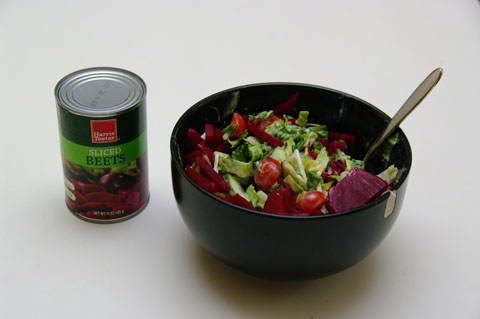Beetroot and Running Performance
There have been a number of studies recently that show Beetroot (beets in the US) improve exercise performance including running. Beetroot juice takes effect within an hour and remains active for days.
1 Recommendations
Eating Beetroot or drinking beetroot juice has no side effects and is highly recommended. Drink about 500ml/1 pint of beetroot juice or a tin of beetroot (15oz) each day. Do not clean your teeth or use a mouthwash immediately before consuming the beetroot.
2 Details
Studies[1][2][3][4][5]indicate that beetroot juice has a number of benefits
- Reduction in the oxygen required across a range of efforts.
- This is without any increase in blood lactate that would indicate nonoxidative energy production.
- Increased time to exhaustion in maximal exercise with VO2max unchanged.
- Reduced resting blood pressure.
3 Implications for Runners
Beetroot supplementation is the only known way of reducing the energy cost of exercise (improved Running Economy). This reduction in energy cost is especially important for marathon runners, where the Glycogen stores are a limiting factor in performance. Runners focused on shorter distances would benefit from the increased time to exhaustion at high intensity.
4 Period of Effect
The changes from beetroot take effect in about 30 minutes, peak after 90 minutes, stay elevated for 6 hours[6] and remain effective for at least 15 days[4] Taking beetroot juice daily will build up the effect over a 3-4 days then plateau.
5 Active Component
One study[2] removed the Nitrates from the beetroot juice and found that the effects also disappeared, indicating that the Nitrates are the active ingredient. The Nitrates (NO3) in beetroot juice are converted to Nitrites (NO2), and it is the nitrite that has the effect. Using an antibacterial mouthwash before taking beetroot juice prevents the nitrate being turned into nitrite[7].
6 Side Effects
The only documented side effects of beetroot (other than the taste) is Beeturia, which is pink or red colored urine. While this effect may be disconcerting, it is harmless and effects only about 10-14% of the healthy population. However, you are far more likely to have Beeturia if you are anemic, so have your blood checked if you get the symptoms, just in case. There are many other reported side effects of beetroot, including paralysis of vocal cords, have been reported on the internet, but I've found no documented cases and this appears to be urban legend[8].
Contents
7 The spinach alternative?
Another source of nitrate is spinach, which may be a substitute for those that don't like beets. Around 100-300g of spinach are claimed to have similar results to the equivalent weight of beets[9][10][11]. Canned beets contain 170-290 mg/100g nitrates[12], and the spinach petioles (stalks) can contain a similar 10-260 mg/100g, but the spinach leaves only contain 4-12 mg/100g[13]. Also, note that cooking reduces the nitrate levels in spinach[14]. Some studies[15] used Sodium Nitrate directly, at a level which may be equivalent to about 300g of spinach. Eating 300g (10oz) is about 7 cups of spinach, which would take some dedication to consume.
7.1 References
- ↑ Dietary nitrate reduces maximal oxygen consumption while maintaining work performance in maximal exercise. http://www.ncbi.nlm.nih.gov/pubmed/19913611
- ↑ 2.0 2.1 A toast to health and performance! Beetroot juice lowers blood pressure and the O2 cost of exercise http://jap.physiology.org/content/110/3/585.extract
- ↑ Dietary nitrate supplementation enhances muscle contractile efficiency during knee-extensor exercise in humans http://jap.physiology.org/content/109/1/135.short
- ↑ 4.0 4.1 Acute and chronic effects of dietary nitrate supplementation on blood pressure and the physiological responses to moderate-intensity and incremental exercise http://ajpregu.physiology.org/content/299/4/R1121.short
- ↑ Dietary nitrate supplementation reduces the O2 cost of low-intensity exercise and enhances tolerance to high-intensity exercise in humans http://jap.physiology.org/content/107/4/1144.full
- ↑ Acute Blood Pressure Lowering, Vasoprotective, and Antiplatelet Properties of Dietary Nitrate via Bioconversion to Nitrite http://hyper.ahajournals.org/cgi/content/full/51/3/784?ijkey=5ec725973d624beded6be2d3792e3ed9a10b09d2
- ↑ The increase in plasma nitrite after a dietary nitrate load is markedly attenuated by an antibacterial mouthwash http://www.ncbi.nlm.nih.gov/pubmed/18793740?dopt=Abstract
- ↑ What Are the Benefits of Drinking Beet Juice? http://www.livestrong.com/article/343584-what-are-the-benefits-of-drinking-beet-juice/
- ↑ FJ. Larsen, E. Weitzberg, JO. Lundberg, B. Ekblom, Dietary nitrate reduces maximal oxygen consumption while maintaining work performance in maximal exercise., Free Radic Biol Med, volume 48, issue 2, pages 342-7, Jan 2010, doi 10.1016/j.freeradbiomed.2009.11.006, PMID 19913611
- ↑ FJ. Larsen, B. Ekblom, K. Sahlin, JO. Lundberg, E. Weitzberg, Effects of dietary nitrate on blood pressure in healthy volunteers., N Engl J Med, volume 355, issue 26, pages 2792-3, Dec 2006, doi 10.1056/NEJMc062800, PMID 17192551
- ↑ Nitrate from spinach boosts muscle mitochondria function http://ihealthbulletin.com/blog/2011/02/02/nitrate-spinach-boosts-muscle-mitochondria/
- ↑ C. Y. Lee, R. S. Shallenberger, D. L. Downing, G. S. Stoewsand, N. M. Peck, Nitrate and nitrite nitrogen in fresh, stored and processed table beets and spinach from different levels of field nitrogen fertilisation, Journal of the Science of Food and Agriculture, volume 22, issue 2, 1971, pages 90–92, ISSN 00225142, doi 10.1002/jsfa.2740220212
- ↑ Z. Yosefi, R. Tabaraki, H. A. Asadi Gharneh, A. A. Mehrabi, Variation in Antioxidant Activity, Total Phenolics, and Nitrate in Spinach, International Journal of Vegetable Science, volume 16, issue 3, 2010, pages 233–242, ISSN 1931-5260, doi 10.1080/19315260903577278
- ↑ William E. J. Phillips, Changes in the nitrate and nitrite contents of fresh and processed spinach during storage, Journal of Agricultural and Food Chemistry, volume 16, issue 1, 1968, pages 88–91, ISSN 0021-8561, doi 10.1021/jf60155a012
- ↑ FJ. Larsen, TA. Schiffer, S. Borniquel, K. Sahlin, B. Ekblom, JO. Lundberg, E. Weitzberg, Dietary inorganic nitrate improves mitochondrial efficiency in humans., Cell Metab, volume 13, issue 2, pages 149-59, Feb 2011, doi 10.1016/j.cmet.2011.01.004, PMID 21284982
